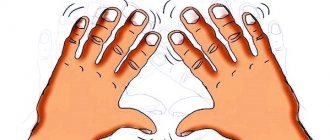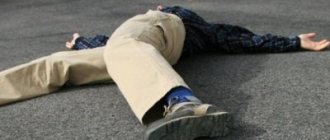Astheno-neurotic syndrome is a type of neurosis that can occur in both adults and children. Asthenoneurosis leads to people becoming nervous and constantly experiencing increased fatigue. The disease is often called asthenia, neuropsychic weakness, chronic fatigue syndrome, asthenoneurosis or asthenic syndrome.
The disease usually arises and develops due to abnormalities in the activity of the entire autonomic nervous system. A person with asthenic syndrome constantly needs support and protection.
The number of patients with asthenia increases several times every year. The sharp increase in the growth of cases is associated with an accelerated pace of life, poor ecology, regular stress and depression. Astheno-neurotic syndrome often worries vulnerable children who take everything “to heart,” actively react to any stimuli and get upset even because of small failures.
Asthenoneurosis can be confused with fatigue, which occurs with increased mental or physical stress. According to the ICD, 10 patients are diagnosed with code F48.0, which stands for other neurotic disorders.
Causes of the disease
The causes of the appearance and development of the syndrome include a fairly large group of factors. Sometimes determining why a disease occurs is quite difficult. To do this you need to find a truly qualified specialist.
The most common causes of asthenic syndrome include:
- Frequent stress. Strong experiences and tragic events can lead to overstrain and exhaustion of the nervous system, and, consequently, to the occurrence of asthenia.
- Infectious diseases. Any infection that occurs along with fever and intoxication of the body causes the death of nerve cells and the appearance of asthenic syndrome.
- Brain injuries. Even minor bruises often lead to disruption of the functioning of the entire brain. Injuries become especially dangerous in childhood, when the bones of the body are still weak and fragile, and the brain is actively increasing in size. It is because of this that you should never shake or toss a newborn baby.
- Regular overstrain of the nervous system. Lack of rest and a corresponding deterioration in well-being now occurs in every second person on Earth. Recently, even children have begun to face this problem.
- Vitamin deficiency. The decline in the amount of minerals and vitamins in the body leads to exhaustion and weakening of the nervous system.
- Intoxication. Smoking, alcohol abuse and drug use poison brain tissue, causing the death of a huge number of nerve cells.
- Diseases of the endocrine system. Disturbances in the functioning of the pancreas, thyroid and gonads often lead to cell death and the development of asthenia.
- Personal characteristics of a person. Quite often, asthenoneurosis occurs in those people who underestimate themselves as individuals. Patients also become prone to excessive dramatization and suffer from increased impressionability.
- Social factors. Every person sooner or later experiences difficulties at work, in school or in his personal life. All these cases also have a negative impact on the functioning of the autonomic nervous system.
In children, astheno-neurotic syndrome can occur due to:
- Fetal hypoxia;
- Infections during the intrauterine development of a child;
- Injuries received during childbirth;
- Various defects of the nervous system;
- Bad habits of the mother during pregnancy.
Causes
Neurasthenia develops in people against the background of mental and physical overload, which, in turn, provokes overwork of the body. The reason for the development of this condition can be internal conflicts, a weak psyche, long-term adherence to a very strict diet, etc.
The occurrence of neurasthenia is influenced by predisposing and provoking factors. Predisposing ones include:
- increased anxiety;
- tendency towards perfectionism;
- period of recovery after somatic illnesses.
Provoking include :
- severe stress;
- conflict situations in the family and at work;
- lack of normal rest for a long time;
- previous traumas, including birth injuries;
- previous surgical interventions;
- infectious diseases;
- poor nutrition and, as a result, deficiency of vitamins and other important substances;
- alcohol abuse, smoking;
- lack of physical activity;
- lack of sleep;
- intoxication;
- endocrinological disorders;
- unfavorable psychosocial conditions;
- severe weather conditions, etc.
Symptoms of asthenoneurosis
Typically, patients do not attach much importance to the first signs of the syndrome, as they attribute them to fatigue. People turn to a doctor for help when it becomes impossible to cope with accumulated problems on their own. Most often, the diagnosis is made if there are no somatic or neurological disorders.
The first symptoms of asthenic syndrome include:
- Apathy and causeless irritability;
- Regular fatigue;
- Decreased immunity, which leads to the occurrence of infectious and colds.
In children, severe asthenoneurosis manifests itself differently than in adults. The child is observed:
- Sudden mood changes;
- Lack of appetite and complete refusal to eat;
- Uncontrollable attacks of aggression;
- Frequent crying and moodiness;
- Taking out anger on toys and favorite things;
- Continuous fatigue;
- Regular pain in different areas of the head;
- Decreased academic performance at school;
- Difficulty communicating with other children.
Stages of asthenic syndrome
Doctors distinguish 3 stages of asthenoneurosis:
At first, neither patients nor their loved ones usually suspect the presence of pathology. People associate all the accompanying symptoms of asthenia with fatigue and do not take the first signs of the disease seriously. Gradually, a person ceases to control his behavior; at any moment he can suddenly laugh or cry.
At the next stage of development of the disease, excessive emotionality and deterioration of well-being appear: frequent headaches, a constant feeling of fatigue, and decreased performance. The patient is regularly bothered by insomnia; he always wants to lie down to rest, but his strength is not restored even after sleep.
During the third stage, the clinical picture of the syndrome becomes obvious. Fatigue and anxiety are replaced by complete indifference to absolutely everything that happens around. A person is no longer interested in films, any kind of entertainment, or new acquaintances. Prolonged depression appears, which can only be overcome with the help of antidepressants.
Typically, people with astheno-neurotic syndrome seek medical help at the second or third stage, when it is no longer possible to cope with the disease on their own. If the syndrome has reached the final stage, patients no longer try to improve their well-being. Relatives and friends bring them to the doctor.
How is the treatment carried out?
Many people are interested in how to treat astheno-neurotic syndrome in children. Therapy is complex. Treatment begins only after a thorough diagnosis of the causes of dysfunction of the nervous system. There are special tests to determine the level of disorders, instrumental diagnostic methods to identify possible pathologies in the brain or malfunction of internal organs (X-ray, magnetic resonance imaging, encephalography). Therapy includes general advice and treatment through medication and psychotherapy.
As a rule, drug therapy is complemented by gymnastics and physiotherapeutic procedures that are aimed at calming the nervous system. Among them, darsonvalization, electrosleep and hydrotherapy should be noted.
Consequences and complications of the disease
Most often, asthenoneuratic syndrome occurs in a chronic form. But if at least minimal treatment of the pathology is absent, serious complications can arise:
- Stroke;
- Heart attack;
- Stomach ulcer and exacerbation of gastrointestinal diseases;
- Hormonal imbalances.
Also, in the absence of adequate therapy, depression may occur, which sometimes even leads to suicide. In the initial stages of the disease, a person is still able to help himself.
Complications of asthenia in children can lead to malfunctions of the thyroid gland, and, consequently, to disorders in the reproductive system. In adults, problems with reproductive function may occur.
Failure of the autonomic system
Manifestations of neurasthenia from the autonomic nervous system can mask the pathology of internal organs. How does astheno-neurotic syndrome occur in children?
The main manifestations include:
- unpleasant sensations and a tingling feeling in the heart area, these manifestations are most expressed during stress, mental and emotional overload;
- presence of tachycardia;
- increased sweat production.
Sometimes asthenia may be accompanied by a slight increase in body temperature to 37.5º C, especially if a malfunction of the central nervous system was caused by an increase in the production of thyroid hormones.
Diagnostics
Diagnosis of the disease, first of all, involves an oral interview with the patient. The doctor must find out everything that worries the patient. Usually the clinical picture of the disease becomes clear in its first stages. That is why it is not difficult to start treating asthenic syndrome as early as possible. The main thing is to determine the real cause of the disease, since it is its elimination that guarantees successful treatment and complete recovery of the patient.
Diagnosis of asthenic syndrome
Diagnosis of asthenic syndrome does not cause difficulties for doctors of any specialty. If the syndrome is a consequence of an injury, or develops against the background of a stressful situation or after an illness, then the clinical picture is quite pronounced.
If the cause of asthenic syndrome is any disease, then its signs can be veiled by the symptoms of the underlying pathology. Therefore, it is important to interview the patient and clarify his complaints.
It is important to pay maximum attention to the mood of the person who comes to the appointment, find out the peculiarities of his night's rest, clarify his attitude to work responsibilities, etc. This should be done, since not every patient can independently describe all his problems and formulate his complaints.
When interviewing, it is important to take into account that many patients tend to exaggerate their intellectual and other impairments. Therefore, not only a neurological examination is very important, but also a study of the intellectual-mnestic sphere of a person, for which there are special tests and questionnaires. Equally important is the assessment of the patient’s emotional background and his reaction to certain external stimuli.
Asthenic syndrome has a similar clinical picture with neurosis of the depressive type and hypochondriacal type, and with hypersomnia. Therefore, it is important to carry out a differential diagnosis with these types of disorders.
It is necessary to identify the underlying pathology that could provoke asthenic syndrome, for which the patient must be referred for consultations to specialists of various profiles. The decision is made based on the patient’s complaints and after his examination by a neurologist.
Treatment of asthenoneurosis
Therapy for the syndrome should be comprehensive and include several areas:
- Taking medications. Usually, during the first stage of development of the syndrome, one can limit oneself to the use of herbal tea, vitamin complexes and the use of traditional medicine. If a person’s health worsens, the doctor prescribes various sedatives, and sometimes antidepressants.
- Psychological help. In the early stages, the disease can be cured even at home: aromatherapy, relaxing baths and walks in the fresh air.
- Healthy lifestyle. Proper nutrition, exercise and a clear daily routine will help cope with any disease, including asthenoneurosis.
Drug treatment
Drug therapy involves taking the following drugs:
- Sedatives: “Sedasen”, “Persen”, as well as tinctures of motherwort, hawthorn and valerian. The course of treatment must be at least two weeks.
- Antidepressants with the least number of side effects: Novo-Passit, Azafen, Doxepin, Sertraline.
- Antiasthenic agents: Enerion and Adamantylphenylamine.
- Nootropics: “Phenibut”, “Cortexin”, “Nooclerin”.
- Adaptogens: “Chinese lemongrass”, “Eleutherococcus tincture”.
- Vitamin complexes: “Neuromultivit”.
Physiotherapeutic procedures are also usually prescribed along with drug treatment: therapeutic massage, aromatherapy, electrosleep and reflexology.
Psychotherapy
Therapy for asthenic syndrome is impossible to imagine without the help of a psychologist. The patient should definitely visit a specialist to clarify the diagnosis and prescribe appropriate treatment.
Typically, a psychotherapist advises a patient to take a break from his own illness and take up a hobby, for example, collecting coins, crocheting or painting. Also, art therapy or sand therapy has been helping patients cope with asthenoneurosis for many years. You should not neglect breathing exercises, as it helps not only to relax the whole body, but also to recharge yourself in a good mood.
The following recommendations will help you cope with the disease:
- First of all, you need to get rid of all bad habits;
- You should do strength exercises and expose your body to cardio exercises every day;
- Work should always be alternated with rest; you should not overexert yourself;
- It is worth adding more meat, soy, beans and bananas to your usual diet;
- It is mandatory to take vitamin complexes;
- And the most important thing is to maintain a great mood throughout the day.
Traditional therapy
First of all, we should not forget that treating asthenia only with traditional methods is extremely undesirable, since a positive effect can only be obtained with complex therapy. But as an additional effect, doctors recommend the following recipes:
Mint leaves, trefoil roots and valerian in equal proportions, approximately 2 tbsp. l., you need to finely chop and mix. Afterwards, add 2 tsp to a glass of boiling water. collect, leave for an hour in a warm place, then strain. Every day you should drink half a glass in the morning and evening. The course of treatment is a month.- 2 tbsp. l. motherwort should be poured with a glass of boiling water and placed in a water bath for 20-30 minutes, without bringing to a boil. Then you should add boiled water to the volume that was in the bowl at first. Take the decoction 3 times a day before meals, 1⁄3 of a glass.
- Valerian and motherwort can also be taken in tablet form. The attending physician must determine the required dosage. To prepare an infusion of valerian officinalis, add a tablespoon of the herb to hot boiled water and leave for 20 minutes. Take a quarter of a glass three times a day and before bedtime.
- Chamomile, St. John's wort and hawthorn must be mixed 1 tbsp. l. and pour a glass of boiling water. The infusion should stand for 30-40 minutes. It is recommended to take the medicine before going to bed.
- Combining St. John's wort with dried linden blossom will also help cope with chronic fatigue. You need to mix 1 tbsp. l. components and leave the infusion for 20 minutes. The drink should be taken on an empty stomach in the morning and in the evening before bed, 50 ml. Sometimes an alcohol tincture is prepared from herbs, which must be taken 2-3 drops before meals.
- To improve your mood and stimulate the nervous system, you can take a course of treatment with Schisandra chinensis or Eleutherococcus, which are sold at any pharmacy. The products have a beneficial effect on the entire body, help boost immunity, recharge with energy and a positive mood. Tinctures will also help cope with apathy, hysteria, hypotension and headaches due to asthenic syndrome.
Diet for neuro-asthenic syndrome
It is necessary to exclude fatty meat, any fried foods and hot seasonings from the patient’s usual diet. You should limit your consumption of coffee and tea; you can replace them with infusion of hawthorn or rose hips. It is recommended to eat as many fruits and vegetables as possible. Vegetable oil, black bread and fatty fish will also help improve your well-being. And in order to cheer up, experts recommend eating a slice of dark chocolate a day and under no circumstances consuming baked goods.
Treatment of the syndrome in children
Treatment of asthenic syndrome in children is slightly different from treatment of the disease in adults. To help your child you should:
- Introduce into his diet as much as possible the right healthy food, useful with vitamins and various microelements;
- Eliminate drinks that contain caffeine from your diet;
- Ventilate the baby’s room several times a day;
- In the evening you need to spend time in the fresh air, it is especially useful to walk just before bed;
- Ensure full, healthy sleep both during the day and at night;
- Avoid watching TV and playing on the computer during an exacerbation of the disease.
Treatment
Therapy of the syndrome is aimed at eliminating provoking factors and correcting the symptoms caused by them.
Drug treatment
In the early stages, the use of medications is not necessary; you can limit yourself to:
- fortified food;
- changing the daily routine;
- giving up bad habits;
- using physical relaxation methods (swimming pool, massage, therapeutic exercises).
You can add to the treatment:
- vitamin and mineral complexes;
- herbal sedatives;
- adaptogens;
- nootropics.
If necessary, the doctor will prescribe medications to reduce the severity of symptoms of somatic disorders. For example, small doses of beta blockers for tachycardia. It is imperative to treat the diseases that provoked the development of the syndrome.
In severe cases, strictly medical prescription of psychotropic drugs may be required:
- sedatives;
- tranquilizers;
- neuroleptics;
- antidepressants;
- anxiolytics.
Psychotherapy
It will be useful to use psychotherapy methods at any stage of pathology development. This is a safe and preferred treatment for children. The following psychocorrection methods are often used:
- Art therapy. Sublimation of state with the help of art directions (painting, modeling, singing).
- Pet therapy. Using animals (pets, horses, dolphins) to restore mental balance.
- Gestalt therapy. Interaction between therapist and patient using different methods of contact, such as drawing or play.
When contacting a psychologist, the patient is offered the most comfortable option for therapy.
Prevention of the syndrome
To prevent the disease, the same drugs that are necessary to treat the syndrome are suitable. Experts advise introducing a daily routine, most of which should be rest. You should switch to a healthy diet filled with vitamins and beneficial microelements. In this case, it is necessary to limit the consumption of fats and carbohydrates. Physical exercise and walks in the fresh air will also help distract from the symptoms of “chronic fatigue” and improve a person’s overall well-being.
Treatment with medications
How is astheno-neurotic syndrome treated in children? Treatment with medications is indicated for severe disturbances in the functional activity of the central nervous system.
As a rule, drugs that relieve excitability are used. They help normalize the functioning of the autonomic and central nervous systems. Atarax, Adaptol, Sedative and other means are used.
How to properly eliminate astheno-neurotic syndrome? Treatment with medications in children is carried out on a strictly individual basis. At the same time, the course may include drugs from other pharmacological groups in the presence of diseases of internal organs. Drug treatment can only be prescribed by a neurologist.
Forecast
Asthenoneurosis is not a serious disease if treated promptly. People with asthenia need to be registered with a neurologist, follow all his recommendations and take the necessary medications. A healthy active lifestyle, good mood and a positive outlook on the world also play a decisive role in the treatment of the syndrome. The main thing is not to start the course of the disease, which can lead to memory deterioration, decreased concentration and the development of depression or neurasthenia.
Treatment with psychotherapy
How to treat the disease? Astheno-neurotic syndrome in children can also be eliminated through psychotherapy. It is the basis for the successful treatment of nervous pathology. Depending on the severity of the dysfunction of the nervous system, different methods can be used.
Psychotherapy is a verbal intervention, during which factors traumatic to the psyche are identified, and the child’s attitude towards them changes.
Neurolinguistic programming is one of the methods of psychotherapy in which verbal modeling of a child’s attitude to a stressful situation is carried out.
Conducting individual or group trainings that make it possible to relieve phobias and improve social adaptation, especially when changing teams.
Psychotherapeutic techniques are selected on a strictly individual basis based on diagnostics. Provided that the therapy is carried out well, the prognosis for asthenic syndrome is favorable.
Consequences of astheno-neurotic syndrome
There can be many reasons for the development of the disease, and sometimes factors such as stress at work, military service, pregnancy, and heavy physical activity only further influence the rapid progression of symptoms. Everything in the human body is interconnected, and therefore the problem cannot be ignored under any circumstances. Those factors that yesterday influenced only the nervous system, today can worsen the physical condition. Because of this, the patient will not be able to work, and even a basic trip to the grocery store will turn into stress for him. It is difficult to build a relationship with such a diagnosis due to the person’s temper. What consequences of astheno-neurotic syndrome are considered the most serious?
- Hormonal disorders.
- Against the background of nervous exhaustion, heart problems arise, including heart attacks and strokes.
- A stomach ulcer may develop because nervous disorders affect the functioning of the gastrointestinal tract.
- Children who encounter this problem may suffer in the future due to problems with the endocrine system and slow puberty.
- Chronic depression is the most common consequence of a serious disease of the nervous system.
By ignoring the symptoms of astheno-neurotic syndrome, a person may face signs of clinical depression in the future. He suddenly loses the desire to live, and no changes in life awaken the person’s interest. It is impossible to get yourself out of this state on your own, and against the background of chronic depression, suicidal tendencies often develop.
The syndrome also has consequences for the normal life of a child faced with a problem at an early age. Thus, doctors note disturbances in reproductive function in those adults who experienced symptoms of a nervous disorder in childhood.
The consequences also affect physical well-being: against the background of the disease, the risk of stroke and heart attack increases. Thus, a person who has learned of his diagnosis must immediately begin searching for adequate treatment options.
Treatment methods
Treatment for astheno-vegetative syndrome should be systemic. If the disease is diagnosed in time, it responds well to treatment.
Treatment of pathology is pathogenetic and symptomatic, implemented through the use of drug therapy, physiotherapeutic procedures, lifestyle correction, and the use of traditional medicine. An important role is played by establishing sleep and wakefulness patterns and adjusting the diet.
Massage, balneotherapy, and electrosleep effectively relieve the vegetative manifestations of the syndrome and improve the patient’s psycho-emotional state.
Traditional medicine in combination with medication and physiotherapeutic treatment gives good results in the treatment of the syndrome.
Let's work together to make the unique material even better, and after reading it, we ask you to repost it on a social network convenient for you. net.
Causes of ANS
Mental exhaustion, which is essentially an astheno-neurotic syndrome, has different causes:
- chronic diseases and traumatic brain injuries;
- intoxication;
- social factors;
- wrong lifestyle.
Chronic diseases
A person is a single system in which physical factors influence psycho-emotional ones. A healthy spirit, as you know, can only be found in a body that is not burdened with illnesses. When understanding the reasons that led to the neurotic syndrome, we have to find out whether chronic diseases affect the ANS:
- hypothyroidism (pathology of the thyroid gland);
- hypotension (low blood pressure);
- diabetes mellitus, etc.
Mental disorders are caused by hidden processes of the brain that arise as a result of injuries or are hereditary in nature:
- high cranial pressure;
- circulatory disorders;
- tumors.
The development of the syndrome in children can be affected by hypoxia suffered at birth, underdevelopment of the nervous system, and heredity.
Intoxication of the body
The development of the syndrome can be caused by frequent colds, which must be treated with antibiotics.
Children with persistent acute respiratory viral infections are most often considered to be at risk for ANS. In adults, astheno-neurotic syndrome is observed with constant nicotine intoxication. A common misconception is the “calming” effect of cigarettes. Some adults grab them in stressful situations or when upset by failures. But a bad habit further weakens the nervous system. Nicotine burns all vitamins and dehydrates the body. Therefore, almost all smokers suffer from astheno-neurotic syndrome.
Social factors
An unfavorable atmosphere at work or at home provokes nervous breakdowns.
If you do not figure out this reason in time and do not try to change the situation, attacks of anger or hysteria will become more frequent, grow like a snowball and develop into astheno-neurotic syndrome. The source of mental exhaustion is also the irrepressible desire to build a career. With irrational mental stress, a person faces chronic fatigue, insomnia and nervous diseases.
In children, social causes of ANS are conflicts at school or with friends. Parents must recognize astheno-neurotic syndrome in a child in time and jointly cope with a conflict situation.
Often adults do not understand what is really oppressing their child, who has suddenly become capricious and irritable. They blame children for lack of concentration or poor performance at school, which further provokes the development of the syndrome, which is difficult to treat in an advanced stage.
Wrong lifestyle
The frantic rhythm of modernity is in itself a stress for the body. It must be compensated by a healthy lifestyle and a strict daily routine:
- go to bed on time;
- eat at the same time and more than once a day;
- prevent depletion of the body by vitamin deficiency;
- do not forget to take breaks while working;
- devote time to sports.
Physical and mental fatigue is a quick path to astheno-neurotic syndrome. And if a person does not recognize the first symptoms of ANS in time, the disease can be very serious.
Consequences
Astheno-neurotic syndrome can have the most negative consequences.
A person can be plagued by panic attacks, which have a wide variety of colors - from an attack of “everything is lost” to a panicky fear of death.
The attacks are temporary and begin and end unexpectedly. At this time, tachycardia, a state of mental agitation or lethargy is observed.
Among the physical manifestations during an attack are possible upset stools and excessive urination.
Read more about panic attacks in our articles.
Home and preventive methods of combating the disease
In the early stages of astheno-neurotic syndrome, treatment is simple, and treatment can be carried out at home. To do this, the patient must use the following measures:
- normalize sleep and rest patterns;
- monitor your diet, since the predominance of beneficial microelements in the diet significantly increases the likelihood of healing;
- it is necessary to resort to soothing baths and relaxing massages;
- It is also recommended to reduce your workload, try to spend as much free time as possible in the fresh air;
- if a person is overwhelmed by constant fears, if he is prone to hypochondria and suspiciousness, it is necessary to visit a psychotherapist;
- It is also recommended to drink soothing teas with mint, valerian and lemon balm.
The main secret to a quick recovery is simply simple: you need to give up excessive exercise, sleep more and spend the maximum amount of time in the fresh air.
It is also not recommended to completely give up physical activity and lie in bed, because this only reinforces the apathy characteristic of the symptom. A person can go to the gym, swimming pool, go to nature, go to the cinema and theater.
Since a person is overtaken by depression, psychologists advise looking for those means that improve the patient’s mood. Some people benefit from dancing classes, while others sign up for cooking courses. Such relaxation while doing what you love sometimes turns out to be much more useful and effective than any therapy.
If you cannot cope with the disease on your own, you need to consult a psychotherapist. The doctor will be able to find out the cause of the problem, find out the source of fears and stress and help the person get rid of these stimulating factors.
The astheno-neurotic syndrome itself goes away quickly, but the problem can develop again against the background of increased stress. That is why, if once the problem has already developed, it is necessary to reconsider your own life, bring into it a little more rest and joy. Then any alarming symptoms will disappear.
Disease prevention
In the event of the appearance of asthenic disorders caused by psychogenic stress and social factors, it is necessary to take preventive measures that will minimize the risk of resumption or appearance of asthenia.
These include:
- change of place of work;
- change of environment;
- complete rest;
- quality sleep at a certain time;
- accessible physical exercise;
- relaxing massage;
- swimming;
- reflexology;
- meditative techniques.
What else can you do?
In the modern social environment, stress and physical strain cannot be avoided. But it is necessary to strive to reduce the influence of psychogenic stress on the body. If you are overextended at work, change it.
If you have a conflicting relationship with your boss, find a new job. If you strive to achieve career heights, engage in auto-training or oriental techniques (wu-shu, kung fu, qigong).
Set aside special time for sports, swimming, fitness, yoga. Take time for walks in nature. Get a pet - spending time with pets relieves stress!
Aquarium fish are simply a wonderful way to calm down. A domestic cat of the Russian breed purrs mesmerizingly. A little playful lap dog - and the stress is relieved!
Don't go into deep depression over the loss of a loved one. Life is fleeting!
Many people find it helpful to attend church and attend services. Make it a rule to attend church services on Sundays and holidays. The Church heals the soul, which means that the nerves will be in order.
Do some handicrafts and various crafts. Find yourself a hobby and devote part of your time to your favorite activity.
Finally love yourself. Your happiness should not depend on the whims of fate and other people. Be healthy!
Astheno-neurotic syndrome and medications for its treatment
Treatment with medications for this syndrome occurs only at the final stages of the development of the problem. Doctors usually prescribe a mineral-vitamin complex, but if this does not help, the following medications come into force:
- antidepressants that will help get rid of chronic bad mood and apathy;
- anabolic steroid;
- sedatives that have a positive effect on eliminating signs of apathy and increased anxiety;
- Doctors can also prescribe medications that improve metabolic processes in brain cells.
A doctor should always prescribe medications, since patients themselves cannot choose either the appropriate components or the required dosage. In order to treat advanced disease, sleeping pills and daytime tranquilizers are often prescribed. They, in turn, can cause addiction, so it is necessary to use such drugs only with the permission of a psychotherapist.
Taking vitamins, especially group B and C, has a very positive effect on a person’s well-being. You can also turn to plant-based sedatives. For example, valerian is actively used for these purposes. She helps the patient forget about stress at work, phobias and unnecessary worries. However, it is not recommended to abuse such sedatives, since they can only stimulate the development of general apathy.
If a child encounters a problem, treatment with medications is extremely limited. For children, doctors can only prescribe plant-based sedatives and mineral-vitamin complexes. The same restrictions apply to pregnant women and nursing mothers. The risk of harming the well-being of the unborn baby forces doctors to look for other methods of healing.
Treatment with folk remedies is also quite common. For example, doctors advise drinking infusions of hop cones, motherwort and mint, since these herbs have a calming effect. You can turn to aromatherapy. For these purposes, oils of bergamot, lemon, verbena, geranium and others are used, as they have a calming effect.
You should start your morning with physical therapy or a run, as this will charge the body with energy and allow a person to immediately tune in to the right mood.
When such a diagnosis is made, hospitalization is extremely rarely required. Typically, such a need arises only in cases where the patient can harm himself or others. Chronic depression with suicidal tendencies may lead to temporary isolation for a short period of time for the safety of the patient.
Typically, therapy produces results within 4-7 days after starting its use. Medicines improve a person’s physical condition, and constant walks and the predominance of rest over work affect the patient’s emotional well-being. If the condition does not improve after 7-10 days, you need to consult a doctor again. There are two possible options here: either the specialist made an incorrect diagnosis, or he prescribed the wrong treatment methods.
In conditions of constant stress, a modern person may encounter astheno-neurotic syndrome quite suddenly, but it should always be treated, regardless of his employment and attitude towards the diagnosis. Such a disease can have serious consequences that not only affect mood, but can also shorten a person’s life.
- Self-diagnosis of serious mental disorders
- The first signs and symptoms of epilepsy
- Bipolar affective disorder (BD)









